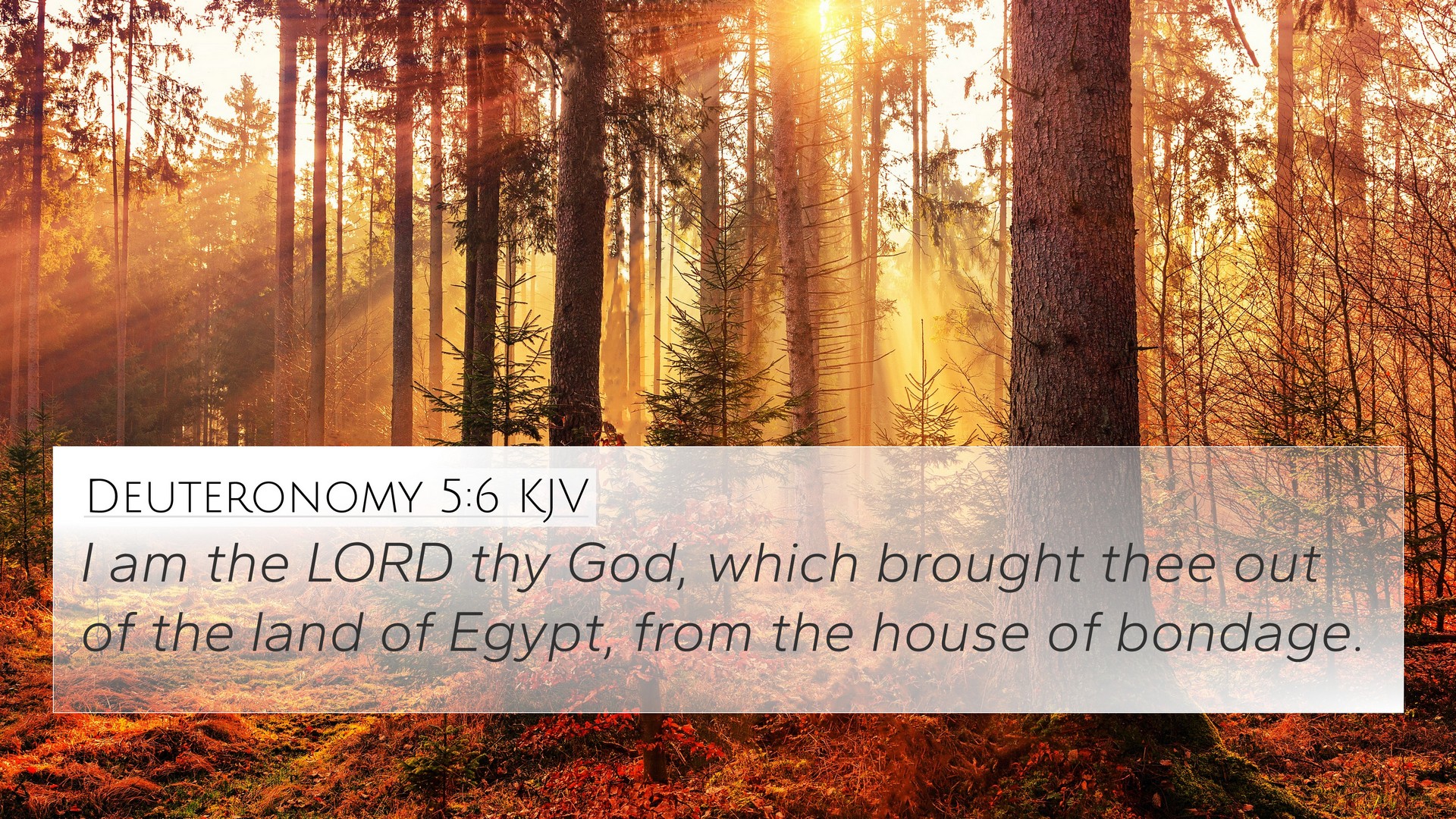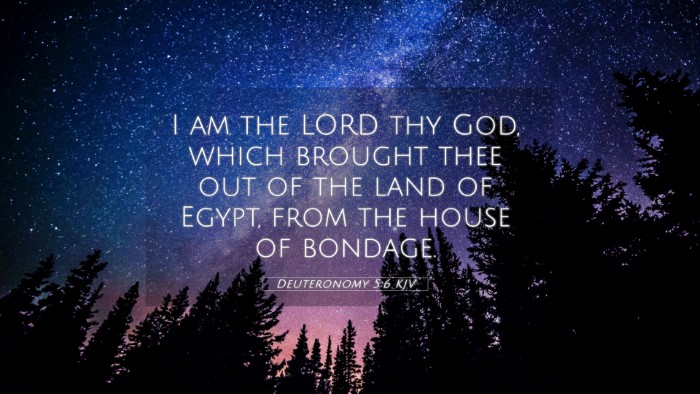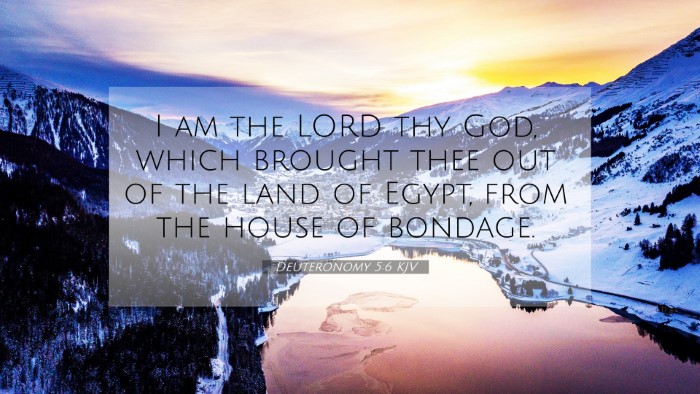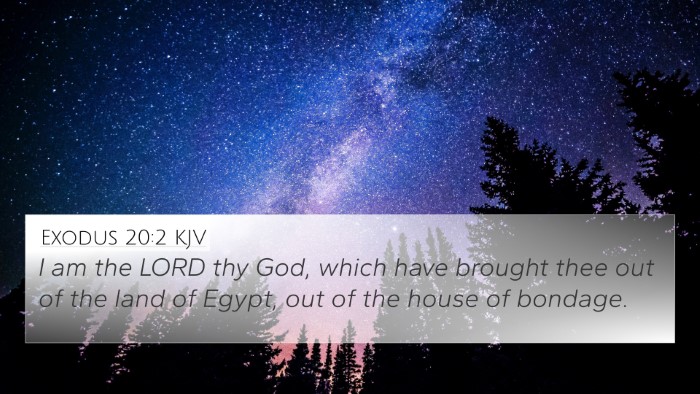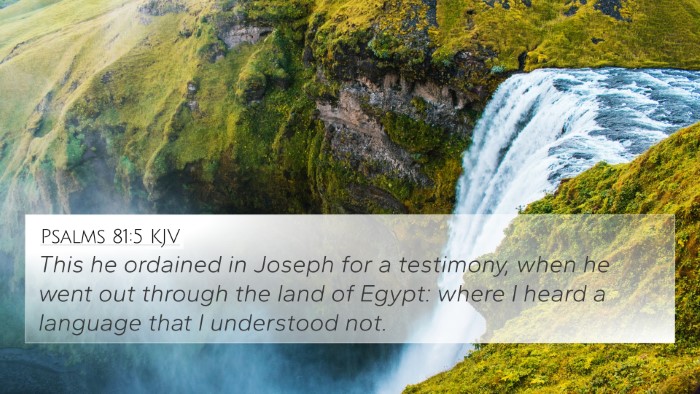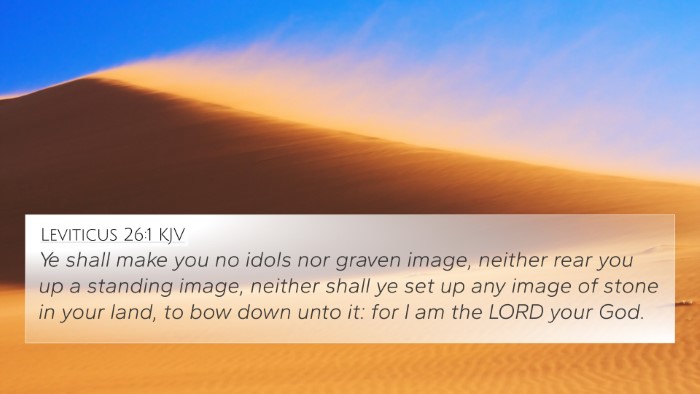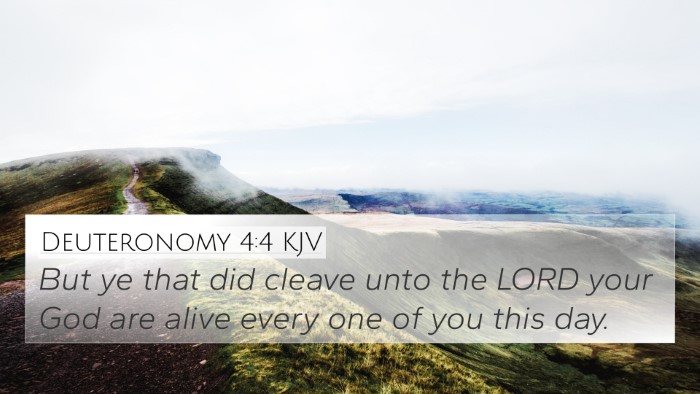Understanding Deuteronomy 5:6
Bible Verse: Deuteronomy 5:6 - "I am the LORD your God, who brought you out of Egypt, out of the land of slavery."
This verse serves as a pivotal declaration of God’s identity and His relationship with Israel. It emphasizes His role not only as the sovereign deity but also as the liberator of the Israelites from oppression in Egypt.
Verse Meaning and Insights
The message derived from Deuteronomy 5:6 can be interpreted through various commentaries, which collectively shed light on its profound meaning. Below are insights based on public domain commentaries: Matthew Henry, Albert Barnes, and Adam Clarke.
-
Matthew Henry's Commentary:
Henry highlights that God's declaration "I am the LORD your God" establishes the basis of Israel's covenant relationship with Him. It reflects God’s authority and the fact that He is a personal God who has acted on behalf of His people. The reference to Egypt symbolizes both physical and spiritual bondage, asserting that deliverance is a sign of God’s grace and power.
-
Albert Barnes' Notes:
Barnes affirms that this proclamation reassures the people of God's guidance and commitment. The action of bringing them out of Egypt is central to understanding their identity as God's chosen people. Barnes emphasizes the themes of remembrance and gratitude, as it is imperative for the Israelites to remember their deliverance and the commandments that follow, which are grounded in this divine act of salvation.
-
Adam Clarke's Commentary:
Clarke discusses the phrase "out of the land of slavery" as a reminder not just of their physical liberation but also of the moral obligations that ensue. The acknowledgment of God’s deliverance should inspire a living faith that manifests in obedience to His commandments. Clarke points out the significance of presenting God’s past actions to reinforce the need for present faithfulness.
Cross-References for Deuteronomy 5:6
This verse is richly connected to several other Scriptures that echo similar themes of deliverance, identity, and obedience:
- Exodus 20:2: "I am the LORD your God, who brought you out of Egypt, out of the land of slavery."
- Leviticus 11:45: "I am the LORD, who brought you up out of Egypt to be your God; therefore be holy, because I am holy."
- Psalms 105:43-45: "He brought out his people with rejoicing, his chosen ones with shouts of joy; he gave them the lands of the nations, and they fell heir to what others had toiled for..."
- Isaiah 43:3: "For I am the LORD your God, the Holy One of Israel, your Savior; I give Egypt for your ransom, Cush and Seba in your stead."
- Jeremiah 31:32: "It will not be like the covenant I made with their ancestors when I took them by the hand to lead them out of Egypt..."
- Ephesians 1:7: "In him we have redemption through his blood, the forgiveness of sins, in accordance with the riches of God’s grace."
- Galatians 5:1: "It is for freedom that Christ has set us free. Stand firm, then, and do not let yourselves be burdened again by a yoke of slavery."
Thematic Connections
In understanding Deuteronomy 5:6, we can see a web of theological themes connecting the Old and New Testaments:
-
God as Deliverer:
This theme appears throughout Scripture, from His deliverance of Israel from Egypt to the ultimate salvation provided through Christ.
-
Covenant Relationship:
The concept of God being personal and relational is fundamental, seen in both the Old and New Covenants.
-
Obedience and Holiness:
As the Israelites are called to obey God’s commandments, believers today are called to live a life reflective of their relationship with Christ.
How to Use Cross-References Effectively
To deepen understanding of Bible verses, one can utilize various tools and methods for cross-referencing:
- Bible Concordance: A useful resource for finding verses that contain specific words related to Deuteronomy 5:6.
- Bible Cross-Reference Guide: This guide provides insights into corresponding verses, allowing for comparative Bible verse analysis.
- Bible Chain References: A method to navigate through interconnected themes and concepts across scripture.
- Bible Cross-Reference System: Employ this system to systematically analyze the relationships between verses.
- Cross-Referencing Bible Study Methods: Engage in focused studies that highlight relationships between texts and themes.
This foundational verse and its interpretations serve as a profound reminder of God’s character and His unwavering commitment to His people. The obligations it establishes remain a guiding principle for believers, encouraging continual reflection on the themes of liberation, covenant, and faithfulness.
